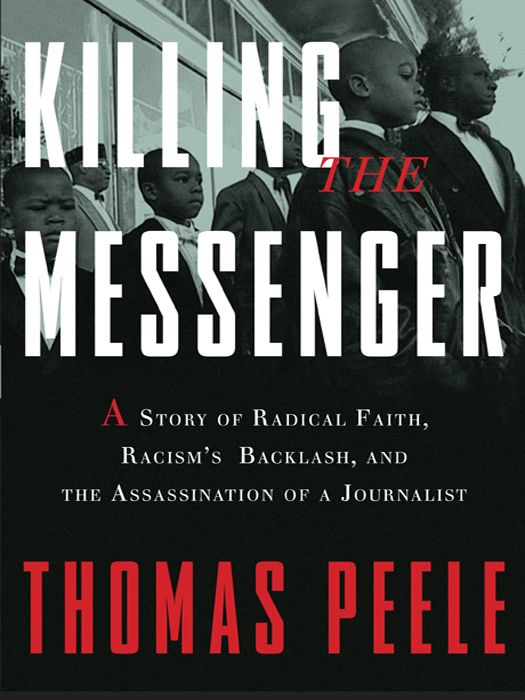
Killing the Messenger
A Story of Radical Faith, Racism's Backlash, and the Assassination of a Journalist
کتاب های مرتبط
- اطلاعات
- نقد و بررسی
- دیدگاه کاربران
نقد و بررسی

December 12, 2011
In a 1959 television interview, the Black Muslim leader Elijah Muhammad looked to the future and declared, “There will be plenty of bloodshed—plenty of it.” In the context of journalist Peele’s eye-opening narrative about radical religion and its consequences, these words turn out to be a gross understatement. Peele spent more than four years investigating the 2007 assassination of Oakland Post reporter Chauncey Bailey at the hands of a cult family called the Beys. He explores the murder as well as the Black Muslim faith, a fundamentalist offshoot of the Nation of Islam. Starting in the late 19th century, Peele traces the origins of the “Black Muslim movement” and provides portraits of leaders including con man W.D. Fard; his emissary Elijah Poole; and Yusuf Ali Bey, the patriarch of the Oakland sect. Peele follows with a multigenerational account of the Beys’s heinous crimes, money-making schemes, and oppressive rule, and their eventual intersection with Bailey. The chain of violence that accompanies the movement’s century-long evolution is staggering, and justice, when it comes, is overdue. Peele renders characters and scenes with rich detail and his chronicle of events surrounding Bailey’s death unfolds with the seamlessness of a fictional thriller, would that were the case. Agent: Elizabeth Evans, Kimberley Cameron.

December 15, 2011
A tale of the rise of a Black Muslim leader, the death of a newspaper editor and the history of the Black Muslim Movement. In his debut, investigative journalist Peele attempts to trace the winding roots of the Black Muslim Movement. Beginning with Nation of Islam founder W.D. Fard, the author moves quickly to the better known Elijah Muhammad before eventually settling on his primary focus, Yusuf Ali Bey, a former barber and Nation of Islam member who recognized the financial benefits that came from his rising power. In the early 1970s, Bey formed a splinter group from the Nation of Islam, solidifying his base in an Oakland bakery while profiting from both his business and his followers. Yet Bey's radical teachings against the so-called "white devil" seemed at odds with his business practices, in which he regularly sold his products to whites. "Bey was hungry for wealth, and if he got it by selling to the devil, so what?" writes Peele. "In that sense the only color that mattered to him was that of money." For Bey, greed quickly overshadowed orthodoxy, though money wasn't all he was after. The smooth-talking leader also demanded his female followers "submit themselves completely to him," a teaching that allowed him to rape and molest dozens. After Bey's death, his son, Yusuf Ali Bey IV--better known as "Fourth"--eventually took control, ruling with his father's violent tactics. After newspaper editor Chauncey Bailey reported on Fourth and his followers, Fourth put a hit out on the journalist's life. In August of 2007, Bailey became a casualty of his story, dying at the hands of a Black Muslim assassin. A complex, carefully constructed story of the development of the Black Muslim Movement and one of its most notorious leaders.
(COPYRIGHT (2011) KIRKUS REVIEWS/NIELSEN BUSINESS MEDIA, INC. ALL RIGHTS RESERVED.)

February 1, 2012
In 2007, Chauncey Bailey, editor of a small weekly newspaper covering Oakland's black community, was murdered to stop his coverage of the ruthless violence, exploitation, and criminal activity of the cultish Black Muslim movement known as the Beys. The group, mistakenly believed to be part of the Nation of Islam, led by the son of the founder, Yusuf Ali Bey, was even more outlandish than the Muslim movement founded by Elijah Muhammad with its belief that whites are devils. Bey's polygamist cult supported itself through a bakery, fraud, and drug trafficking and used violence to secure silence and cooperation. Peele draws on his own investigative research and that of the Chauncey Bailey Project, a group of journalists who worked to ensure that the killing of Bailey did not kill his story. In this riveting account, Peele examines the broader context of the Black Muslim movement; the troubled socioeconomics of Oakland, where the cult recruited young black men, particularly ex-offenders, looking for jobs; and the courage of a black journalist willing to take on the Beys.(Reprinted with permission of Booklist, copyright 2012, American Library Association.)

























دیدگاه کاربران